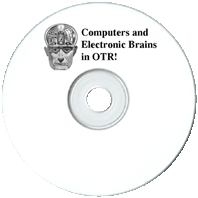

By the end of the Golden Age of Radio, computers had begun to enter the popular imagination largely through the descriptions from Science Fiction.

33 old time radio show recordings
(total playtime 15 hours, 3 min)
available in the following formats:
1 MP3 CD
or
17 Audio CDs
Text on OTRCAT.com ©2001-2025 OTRCAT INC All Rights Reserved. Reproduction is prohibited.


By the end of the Golden Age of Radio, computers had begun to enter the popular imagination largely through the descriptions from Science Fiction. Actual computers of the period were similar to those of fiction, in that they were huge, incredibly complex devices, often the size of an entire office although they might not have as much computing power as a modern microwave oven. Today, it is common to carry a computer nearly as powerful as the monsters from Sci-Fi in our pockets in the form of a smartphone. Most smartphones and personal computers are now connected to the Internet, which depends on the massive amounts of memory storage made possible by huge server farms, essentially warehouses located around the world filled with interconnected computers called servers. These servers are connected to the Internet and the information they store is available to any other computer with access.

Many of the earliest examples of modern programmable computers had military applications. The US Navy developed an electromechanical computer which was small enough to be placed in the control room of a submarine called a Torpedo Data Computer used for targeting a torpedo on a moving target. This was the sort of device our agents were trying to recover the May 20, 1953, broadcast of Dangerous Assignment. It was the huge codebreaking computers that the British developed for codebreaking which became the model for Sci Fi's electronic brains. The Mutual Network's radiotold us stories about "The Thinking Machine", an amateur built computer that could predict stock market movement, and "The Last Smash", about a super computer controlling complex atomic experiments which suddenly could not do basic arithmetic.

See also: Tales of the Brain in Old Time Radio.
Text on OTRCAT.com ©2001-2025 OTRCAT INC All Rights Reserved. Reproduction is prohibited.
You have reached the maximum number of votes for a unregistered user.
Please login or create a new account to continue...
You have reached the maximum number to down votes in this page.



Computers and Electronic Brains Disc A001
|
Add Audio CD to Cart - $5.00 |
Computers and Electronic Brains Disc A002
|
Add Audio CD to Cart - $5.00 |
Computers and Electronic Brains Disc A003
|
Add Audio CD to Cart - $5.00 |
Computers and Electronic Brains Disc A004
|
Add Audio CD to Cart - $5.00 |
Computers and Electronic Brains Disc A005
|
Add Audio CD to Cart - $5.00 |
Computers and Electronic Brains Disc A006
|
Add Audio CD to Cart - $5.00 |
Computers and Electronic Brains Disc A007
|
Add Audio CD to Cart - $5.00 |
Computers and Electronic Brains Disc A008
|
Add Audio CD to Cart - $5.00 |
Computers and Electronic Brains Disc A009
|
Add Audio CD to Cart - $5.00 |
Computers and Electronic Brains Disc A010
|
Add Audio CD to Cart - $5.00 |
Computers and Electronic Brains Disc A011
|
Add Audio CD to Cart - $5.00 |
Computers and Electronic Brains Disc A012
|
Add Audio CD to Cart - $5.00 |
Computers and Electronic Brains Disc A013
|
Add Audio CD to Cart - $5.00 |
Computers and Electronic Brains Disc A014
|
Add Audio CD to Cart - $5.00 |
Computers and Electronic Brains Disc A015
|
Add Audio CD to Cart - $5.00 |
Computers and Electronic Brains Disc A016
|
Add Audio CD to Cart - $5.00 |
Computers and Electronic Brains Disc A017
|
Add Audio CD to Cart - $5.00 |
Please wait...
COMMENTS
Be the first to comment on "Computers and Electronic Brains"
Leave a comment